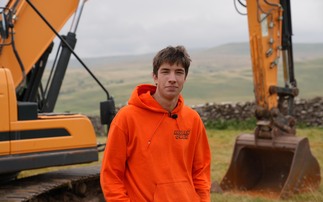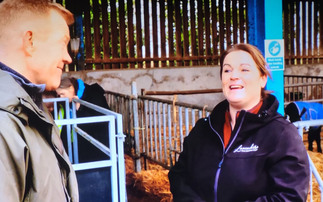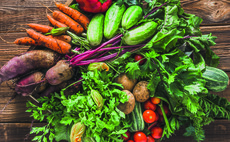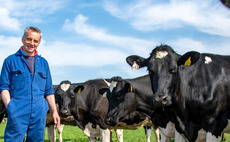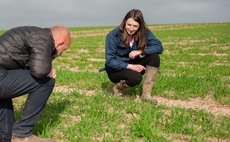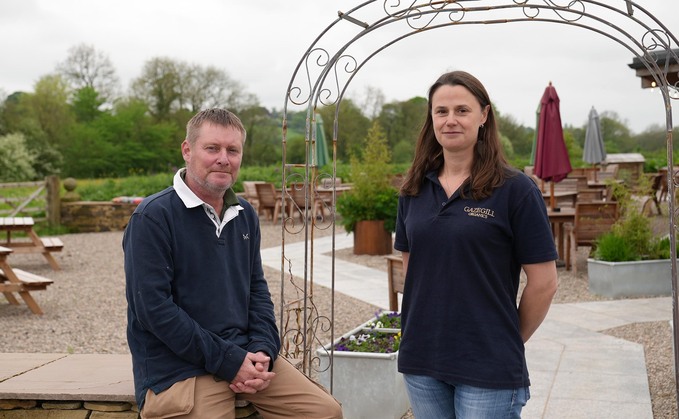
There is something quite magical about Gazegill Farm. It is centuries old, and at the heart of all they do here is good old-fashioned mixed farming - but recently, with a modern foodie twist.
Sat in the heart of the Ribble Valley in Lancashire, it is almost like stepping into a story book – piglets running free, meadows of wildflowers and the sound of birdsong.
Walk through the yard and around the corner however, and nestled by the farm's pastures is Eight at Gazegill, Emma Robinson's and Ian O'Reilly's new sustainable restaurant venture.
Looking out over the 200 acres of land, there is no place more tranquil to enjoy a meal, all of which are made from ingredients from the farm.
Eight completes the couple's business model, having built up a successful raw milk, butchery and meat box business over the years, all based on Emma and Ian's passion for nature friendly food and holistic approach to farming.
WATCH NOW:
It is this aspect, they say, that customers love.
And it is not just simply a marketing strategy; this is more of a belief for the husband-and-wife team.
The farm has been in Emma's family for centuries – bloodlines, she is sure, go back to 1580.
She was passionate about taking the farm on from her parents, and part of Gazegill's success is her determination to secure its story for the future.
READ NOW: Young farmer determined to keep hill farming traditions alive
Dairy history
She says: "I have always been at Gazegill.
"It was just a normal farm that had lost investment.
"Older siblings had left and they did not want to take over and I was not going to let the farm go out on me."
Ian's story is, however, the complete opposite.
Having grown up in central London, he joined the army.
"When I left the army I stayed in Germany, but I decided it was time to do something and came back to the UK," he says.
"I hated London and had friends in Lancashire. I came to visit, met Emma when she was in the pub collecting money for pork and settled - be careful what you buy in a pub."
The couple are very much aligned in their views and mission: Nature comes first, and connecting people back to their food.
Gazegill has always been dairy, but Emma's mum also introduced pigs.
Their journey began when the started doing farmers markets, resulting in them putting in a cutting room.
LISTEN NOW:
"Dairy farmers of Britain then went bump, and we put our bottling line in," says Emma.
"We owed it to the cows to keep it going."
They found success in raw milk – a product which has only grown in popularity over the years, especially as health advocates promote its benefits on platforms like social media. Gazegill has racked up over 10,000 followers on Instagram and both believe there is a huge market in the health space for farmers.
"We had to find a retail home for the quarter of million litres of milk a year," says Ian.
"Raw milk seemed to be the way to go; 10 years ago, there was one million litres sold in the UK - now it is eight million and there is a massive following."
Milking around 85 Dairy Shorthorns, the cows are, Emma jokes, part of the family. They bottle and process everything themselves.
Around 750,000 boxes of goods go out per week, and the onsite shop and butchery is a key attraction.
People like coming to the farm and ‘can see the animals running around.'
The other thing customers enjoy is the couple's commitment to nature and they are keen to showcase that you can farm in a nature-first way and make it work for your business.
READ NOW: Mixture of dairy breeds ensures Irish dairy farm sees success
Emma says: "It has rained and rained, and we have not got in to roll or muck spread, but the curlews have come in and nested so we cannot go in. They were here first."
The fields are biological heritage sites because there are so many different species of flowers in them, but this all harks back to Emma's father who, they say, ‘stood firm in the 1950s and said: I am not making silage grass.'
"He liked nature and birds and meadows, and they have been passed to me.
"That is what customers love now," says Emma.
Educating customers about the connection between food and health is important to them, and they saw a rise in interest during Covid-19. And sales have not dropped – they have an 81 per cent customer retention rate.
"We never used to eat meat three times a day, seven days a week," says Ian.
"The food budget is the one that gets squeezed the most."
Their business model also heavily focuses on using producers across the country who share the same farming principles.
They work with around 35 small family farms who, they say, would otherwise be taking market price.
Ian says: "When we asked what they wanted per head, they were surprised and asked: What can you give me?
"It is about us paying a fair price so they can make a profit and be here the next year to supply us further."
The restaurant is the last piece of the puzzle – and after only 11 weeks the team have already won the Innovation award at the recent Ribble Valley Tourism awards.
They are soon to be the first off-grid restaurant in the UK, and about to sign off 231 kw solar panels to add to the wind panels.
But the idea came from the leftover meat from the farmers' markets.
They have always had a desire to put food from the farm, on a plate, on the farm.
And for just 200 acres, they have 27 members of staff working throughout their enterprises. The nice part is that they are all connected.
Emma says: "The chefs hang out in the butcher's shop and ask: Right, what can we use?
"They do not decide what is on the menu, they look what is available.
"Wild garlic, edible flowers, seasonal. Chipolatas from our pigs with wild garlic and honey from our bees."
Of course, the farm is the epicentre of this. Everything works around it, with a focus back on the soil.
That whole circular business model, starting with the soil which is helped through grazed cattle and managed ‘sensitively' with produce ending up either on the plate in Eight or in a box or bottle, is bought into by customers.
And, says Emma, she has proved to everyone that it can be done – along with Ian she has secured the farm's future and made it a destination in the local area.
As for Ian, he is a long way from London and life in the army.
"I never in a million years thought I would be doing this," he says.
"Hearing people enjoy it and talk about the food and the views, it is a very proud moment."
Interested in diversification? Check out our Land, Leisure and Tourism show











